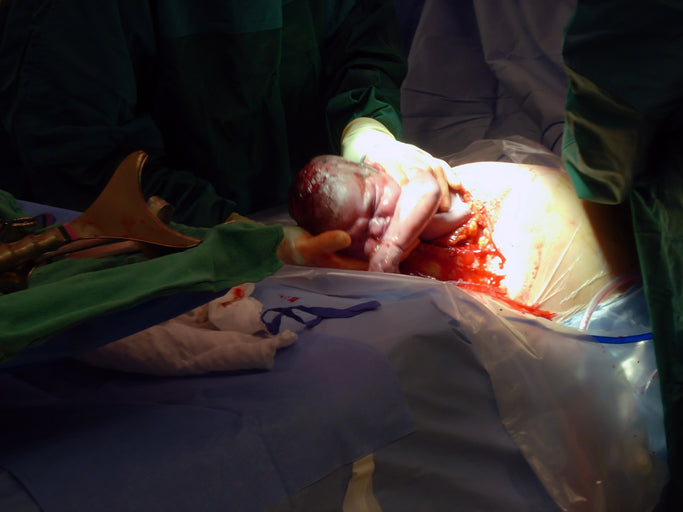3 Common Reasons for an Unplanned C-Section

You want to know everything so that you have the ability to make informed decisions and understand your options. Be grateful that doctors have the ability to save a mother and baby through surgery, but avoiding it whenever possible should be the key. Too many mothers are ending up in the operating room for birth when it could still be prevented.
3 Most Common Reasons for an Emergency C-Section
#1 Failure to Progress
According to Evidence Based Birth, failing to progress is the #1 reason for an unplanned c-section today. There is this expectation of birth that you should dilate 1cm every hour and push for an hour and then be holding your baby. But the reality is so much different. Every woman’s labor is different. The baby and body work together to reach the point of bringing baby into the world. It can be fast and furious, or a slow, long journey taking a few days. If medication intervention is given (like and epidural) it can greatly slow the journey down. A first time mother may push for 2-3 hours on average.
This timeframe is not reason for a c-section. The baby is not ‘too big’ after this timeframe. There can be extreme cases of poor positioning for the baby, but even that may be helped by moving the mother’s pushing position. However, a mother confined to her back on a bed may have trouble altering her position, especially with an epidural. But, slight changes can be made before opting for a c-section.
The key is that labor should not be placed on a clock. That, and a mother should be able to trust in her body’s abilities.
#2 Induction
An induction, both elective and necessary, greatly increases the risk of experiencing a c-section. When labor is ‘jump started’ before the baby and body have finished growing together, it includes many interventions. These interventions can affect the labor, the pain, the birth, and the baby. If medically necessary, preparing for an induction should include being knowledgeable on c-sections and your wishes if a c-section is needed.
An elective induction, one in which you agreed upon with your doctor (not due to medical problems, preeclampsia, or placenta previa), generally leads to a labor that fails to progress. Waiting for your baby to come when he is ready, even if that is an extra week or more longer than you had planned, provides the healthiest birthing opportunity for both you and baby.
#3 Fetal Distress
According to AmericanPregnancy.org:
“The term fetal distress has been used to describe when the fetus does not receive adequate amounts of oxygen during labor. It is oftentimes detected through an abnormal fetal heart rate. However, while the term fetal distress is commonly used, it is not well defined. This makes it more difficult to make an accurate diagnosis and provide proper treatment. Because of the term’s ambiguity, its use has the potential to lead to improper treatment.”
While the term itself is scary to hear, being educated and understanding when it is being used correctly is the key. Most people believe that fetal distress means birth asphyxia, but the two are not the same thing. A baby’s heartrate should drop during a contraction, that is normal. It then begins to recover after the contraction ends. As a mother labors through the transition stage, the contractions hit continuously and painfully. A mother who has had an epidural may not feel the pain aspect, but the body is still experiencing these continuous waves of contractions. This means that the baby’s heartrate may stay lower than normal for a period of time until the transition has ended. An unmedicated laboring mother who is connected to heartrate monitors clearly demonstrates the transition stage and it is easy to understand that it is not fetal distress, but part of a natural labor. In cases of fetal distress situations, it is very hard to know if it truly is an emergency or not.
You will make the decision you feel is right in the moment, but it doesn’t mean you won’t do it differently during the next pregnancy - or perhaps, the exact same way. The beauty of your birth is that it is yours alone to learn from and treasure forever.







